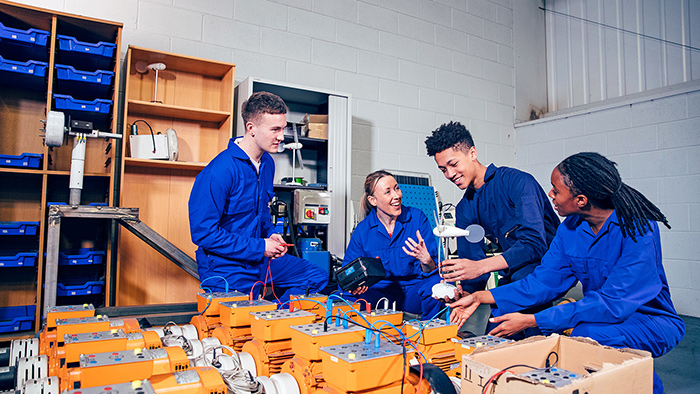A call to action for rural America’s schools and industry to seize the reshoring opportunity.
by Sarah Tucker-Ray
The United States is at a pivotal moment. A confluence of factors—ranging from the COVID-19 pandemic to geopolitical shifts and the rapid evolution of artificial intelligence—has prompted a renewed focus on reshoring and economic resilience. Over the past five years, hundreds of billions of dollars have been invested in advanced manufacturing across the country, with global companies making unprecedented commitments to build and expand facilities on American soil.
Yet, amid this economic transformation, two critical opportunities remain underappreciated. First, rural America stands to benefit disproportionately from this wave of investment. McKinsey analysis reveals that 63 percent of the $1 trillion in announced advanced-manufacturing projects are expected to be located within 15 miles of rural communities. Second, the success of this reshoring movement hinges on a factor that has received far too little attention: the role of K–12 education in preparing the next generation of workers for the demands of advanced manufacturing. Especially given that many of these jobs will be occupied by Americans with high school diplomas or after a specific credentialing program.
This is a once-in-a-generation opportunity for rural schools and industry to join forces. Together, they can create a brighter future for rural businesses, communities, and students. But the stakes are high. Without a sufficient supply of qualified workers, the promise of reshoring could falter, leaving rural communities unable to fully capitalize on this economic windfall. To avoid this outcome, we must act now to align the efforts of schools, industry, and government to prepare students for the future of work.
The potential benefits of reshoring for rural America are staggering. McKinsey estimates that improved productivity and employee retention could generate $20 billion annually, while rural workers could see an additional $34 billion in wages. However, these gains are not guaranteed. By 2030, the United States could face a shortfall of 2.1 million qualified manufacturing workers. This gap underscores the urgent need for rural K–12 schools to play a central role in equipping students with the skills required for advanced manufacturing careers.
The challenge is twofold. First, rural schools must ensure that students graduate with strong foundational skills in literacy, math, and critical thinking—skills that are essential not only for advanced manufacturing but for the workforce more broadly. Second, schools and industry must collaborate to implement high-quality, evidence-based career-connected learning programs that bridge the gap between high school, postsecondary education, and the workplace.

The first action is to ensure that students graduate from high school with skills in literacy, math, and critical thinking. Unfortunately, recent trends are concerning. National Assessment of Educational Progress (NAEP) scores in reading and math have declined over the past decade, with the steepest drops among the nation’s lowest-performing students.
Rural schools must prioritize core academic skills, and industry can play a critical role in reinforcing their importance. For example, companies can partner with schools to provide resources, mentorship, and real-world applications of math and literacy skills, helping students see the relevance of their education to future careers.
The second essential part of preparing students for the technical and STEM-based skills required in advanced manufacturing is a focus on career-connected learning. This approach goes beyond traditional career days or one-off initiatives. Instead, it involves a comprehensive strategy that includes:
None of these initiatives can succeed without strong partnerships between schools and industry. Employers must take an active role in shaping curriculums, providing apprenticeships, and offering workplace learning opportunities. In return, they gain access to a pipeline of well-prepared workers who are ready to contribute from day one.
The reshoring movement represents a generational opportunity to transform rural America. By aligning the efforts of schools, industry, and government, we can create a future where rural students graduate with the skills they need to thrive in advanced manufacturing careers of the future. If we act, the benefits will extend far beyond the workplace, enhancing economic mobility, strengthening communities, and revitalizing rural economies.

About the Author
Sarah Tucker-Ray is a Partner at McKinsey & Company. She advises leaders in government, non-profits, and the private sector to develop new strategies and improve operations. She specializes in helping governments better deliver services through customer-experience and design approaches and promote economic growth through strategic investment. She has worked in the United States across federal, state, and local levels and with national governments globally. Alongside her client work, Sarah is a leader of the McKinsey Institute for Economic Mobility, McKinsey’s internal think tank focused on inclusive economic growth.
Sarah is originally from Memphis, TN, with family throughout the rural Mississippi Delta. She currently resides in Washington, D.C.
Read more from the author:
Small towns, massive opportunity: Unlocking rural America’s potential | McKinsey Institute for Economic Mobility, August 2025
Who is Rural America? | McKinsey Institute for Economic Mobility, March 2025
Manufacturing in rural America: A plan for K–12–industry partnerships | McKinsey Institute for Economic Mobility, August 2025
Scott Ellyson, CEO of East West Manufacturing, brings decades of global manufacturing and supply chain leadership to the conversation. In this episode, he shares practical insights on scaling operations, navigating complexity, and building resilient manufacturing networks in an increasingly connected world.